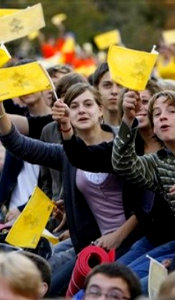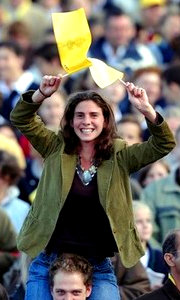
About Andrew Cusack
 Writer, web designer, etc.; born in New York; educated in Argentina, Scotland, and South Africa; now based in London.
Writer, web designer, etc.; born in New York; educated in Argentina, Scotland, and South Africa; now based in London. read more
News
Blogs
Reviews & Periodicals
Arts & Design
World
France
Mitteleuropa
Knickerbockers
Argentina
The Levant
Africa
Cape of Good Hope
Netherlands
Scandinavia
Québec
India
Muscovy
Germany
Academica
“There is no Generation Benedict”
 So claims Germany’s Catholic youth leader Dirk Tänzler, who is ‘reserved’ & ‘ambivalent’ about the Pope. Is Tänzler right?
So claims Germany’s Catholic youth leader Dirk Tänzler, who is ‘reserved’ & ‘ambivalent’ about the Pope. Is Tänzler right?
AMIDST THE MEDIA’S attempts to sling mud at Pope Benedict XVI, one of the most prominent Catholic youth leaders in Germany has chimed in with lackluster words about the reigning pontiff. Dirk Tänzler, the head of the BDKJ, the umbrella group of German Catholic youth organizations, gave an interview to Der Spiegel, the prominent weekly news magazine with a circulation of over one million. Asked his verdict of the so-far five years of Pope Benedict’s reign, Tänzler responded with the word “ambivalent”. Contrasting Benedict XVI with John Paul II — a “showmaster” — the BDKJ head said that, despite some good points, “a lot of young people often simply don’t understand him”. “Most have a different idea of how to live their lives than the pope might imagine for them. There is no ‘Generation Benedict.'”
But are Tänzler’s thoughts an accurate reflection of the state of Catholic youth in Germany or elsewhere? Over a million young people travelled to Cologne to experience World Youth Day with the new pontiff in 2005. (The following WYD held in Sydney in 2008, unfortunately offers little comparison given the relative isolation of Australia). Everywhere the Pope has travelled, such as to the Czech Republic last year, or France and the United States in 2008, vast multitudes of youth have greeted him, often waiting hours for the privilege.
 Significantly, young people in Western countries have proved responsive to the Pope’s message in defiance of the collective anti-Christian persuasion of the dominant cultural forces in their lands. The permanent and vituperative media campaign against Pope Benedict has proved counter-productive: younger people have long ceased to place their trust in the princes of the press and instead take part in more diffused information-gathering networks via the internet. This may have escaped Herr Tänzler who, despite being the head of an umbrella group of Catholic youth, is in his early 40s.
Significantly, young people in Western countries have proved responsive to the Pope’s message in defiance of the collective anti-Christian persuasion of the dominant cultural forces in their lands. The permanent and vituperative media campaign against Pope Benedict has proved counter-productive: younger people have long ceased to place their trust in the princes of the press and instead take part in more diffused information-gathering networks via the internet. This may have escaped Herr Tänzler who, despite being the head of an umbrella group of Catholic youth, is in his early 40s.
Tänzler’s claims have not gone unchallenged, particularly as there is actually an organization of German Catholics which has taken the name ‘Generation Benedict’. One German blogger cited a note from a friend, who is “shocked” about the BDKJ’s claim to speak for all Catholic youth in Germany (if my interpretation of Google’s rather muddled German translation has any accuracy whatsoever). “Apparently those outside of these groups [who make up the BDKJ] are not Catholics,” Benedict-fan Ulrich writes, quipping “Outside the BDKJ, there is no salvation.”
When asked by Der Speigel if he had considered leaving the Church, Tänzler said he had “never even toyed with this idea” but gave as the reason for his certitude not a confidence in the truth of the Church’s claims but instead the rather paltry reason that he is “convinced that the Church and faith are good for society”.
The BDKJ leader did offer some complimentary words in his interview. Tänzler cited Benedict’s “significant contribution” to the Copenhagen climate change conference and the emphasis on justice and love in the social encyclical Caritas in Veritate, and also complimented the Vatican’s efforts to make use of new social media like YouTube and Twitter.
One might suggest that, having reached his forty-first year of age, it might be time Herr Tänzler finally put away the things of a child — except that an enthusiasm for the Holy Father is today a more reliable sign of youth rather than age.
Search
Instagram: @andcusack
Click here for my Instagram photos.Most Recent Posts
- Gellner’s Prague December 19, 2024
- Monsieur Bayrou December 18, 2024
- Dempsey Heiner, Art Critic December 17, 2024
- Vote AR December 16, 2024
- Articles of Note: 12 December 2024 December 12, 2024
Most Recent Comments
Book Wishlist
Monthly Archives
Categories



Good grief, never mind the BDKJ anyway, they haven’t been interested in anything remotely Catholic for ages. They are a typical product of the German Verbändekatholizismus (Catholicism of associations, which are grouped together in umbrella organisations, and still claim to speak for all the Catholics they are aimed at, when in fact their memebership has gone down dramatically and many of their remaining members aren’t even aware of their membership, but become members automatically upon joining some parish group or other) gone wrong since the sixties. “Youth leader” Dirk Tänzler, by the way, will reach the tender age of 41 in less than a month. BDKJ indeed.
Verbaendekatholizismus, alas, is no German prerogative. The Austrians (I am one) suffer from it, too. Something in this milieu seems to breed or favour representatives which the late Erik von Kuehnelt-Leddihn would have described as “Viertel-Katholiken” (Quarter-Catholics) or “Achtel-Haeretiker” (One-eighth-Heretics). Statements tend to follow the “Personally, I am a Catholic, but …” pattern. They always find something to oppose or to criticize; usually it’s the Pope’s stand on some issue, but in a pinch anything to do with the Church’s teaching on sexuality or matrimony will do. For some reason I do not expect much of them any more. I am still waiting for an Obmann of something-or-other complaining about the ghastly yoke of having to pretend to believe in God in order to be able to represent or join his own organization.
A German theology professor told me in 2006 that the reason why German theology professors (including bishops) are so hostile to Benedict is that he himself is a German theology professor. In short, professional jealousy writ large.
Meanwhile, if you love German church architecture, and you have a look at the churches they built after Vatican II, you will cry and cry. Lex horrendi, lex credendi. “Progressives” worldwide have it in for Benedict, but as they usually stop going to Mass at 18, who cares? The ones who stick around are secretly worshipping St. Francis of Assisi, not the Blessed Trinity, and I borrowed that idea from J.D. Salinger, just so you know.
As for Generation Benedict, there has been a “Cardinal Ratzinger Fan Club” on the internet for years and years. My convert husband took “Benedict” for his confirmation name and is among his biggest fans.
Personally, I think he is an infinitely more talented writer than, say, John Paul II. Gave up the whole idea of studying theology for YEARS after grappling with the latter’s “To the Youth of the World.”
Glad to read this article. Thank you very much for citing my letter.
It’s indeed pure nonsense to say that catholic teenagers don’t identify themselves with our Holy Father.
It’s true for many ones, maybe by the youth the BDKJ wants to represent (they obviously don’t let orthodox catholics get any higher funtions there), but they shouldn’t claim their position to be the only one possible.
Instead of helping His Church, they just attack the Pope …
Yes, a very good article, thanks for taking this topic and the link to my blog. I always feel embarrassed when I read or hear something that Dirk Tänzler says. It’s giving the impression, that he thinks, that the Pope has to listen to him. The worst thing is, he is getting paid from the katholic church in Germany for criticizing the pope, what else is he doing anyway….anything thats value added? I am not positive.
Nice article! The BDKJ is a weird phenomenon to behold, indeed!
Question: Why is there a Scientology-ad below the article?
Did you happen to catch the URL of the ad? I need to know that in order to ban the ad.
Yes, a very good article, thanks for taking this topic and the link to my blog. I always feel embarrassed when I read or hear something that Dirk Tänzler says. It’s giving the impression, that he thinks, that the Pope has to listen to him. The worst thing is, he is getting paid from the katholic church in Germany for criticizing the pope, what else is he doing anyway….anything thats value added? I am not positive.